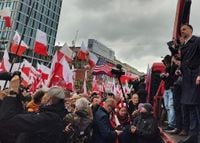On Saturday, May 10, 2025, a "March Against Immigration" took place on the streets of Warsaw, drawing attention to the ongoing debate over immigration policies in Poland. The demonstration commenced at 12:00 PM on the Roman Dmowski roundabout, organized by Robert Bąkiewicz and his "Border Defense Movement." This event saw a significant turnout, including notable politicians from the Law and Justice party (PiS), such as Przemysław Czarnek, Janusz Kowalski, and Dariusz Matecki.
The march, which aimed to voice opposition to mass immigration, proceeded towards the Prime Minister's Office, where protesters expressed their discontent with current immigration policies and the perceived threats posed by migration. Bąkiewicz, a prominent figure in the movement, emphasized the march's importance by stating, "This is a nationwide social initiative aimed at defending Poland against mass migration and the associated threats."
As participants marched, they were met with a series of speeches that underscored the group’s demands. Key among these were calls to restore border controls with Germany, denounce the EU migration pact, halt the construction of infrastructure for migrants, and reject the policy of multiculturalism. Bąkiewicz articulated these sentiments passionately, asserting, "We as a nation do not agree to this social engineering that has destroyed Western Europe and Scandinavia."
During his address, Bąkiewicz made a dramatic gesture by brandishing a scythe, a symbolic act intended to rally the crowd. He urged attendees to raise their own scythes metaphorically, stating, "We call on you to join us in this fight, to wake up that part of the nation that is asleep." This theatrical display was met with cheers from supporters, who echoed anti-immigrant slogans throughout the event.
The presence of PiS politicians added a layer of political significance to the march, as they used the platform to encourage support for their party and criticize the government of Donald Tusk. The politicians took the opportunity to address the crowd, linking their political agenda to the broader themes of national security and immigration control.
In addition to the speeches and demonstrations, the event was marked by logistical challenges. The Warsaw police issued warnings about traffic disruptions in the city center due to the march. Specific areas affected included Al. Jerozolimskie from Ronda Dmowskiego to ul. Krucza, as well as ul. Bracka, pl. Trzech Krzyży, and Al. Ujazdowskie near the Prime Minister's Office. The police were present to ensure public safety during the demonstration.
The rhetoric surrounding the event was intense, with Bąkiewicz claiming that Germany is waging a hybrid war against Poland. This assertion reflects the broader narrative among some Polish nationalists who view immigration as an existential threat to the nation. The Border Defense Movement’s activities and the march are part of a larger trend in Poland, where immigration remains a contentious issue.
As the march concluded, it became clear that the event was not just a protest but a rallying point for those who feel strongly about Poland's immigration policies. The participants' fervor highlighted the divisions within Polish society regarding immigration and national identity.
While the march was largely peaceful, the underlying tensions surrounding immigration in Poland continue to simmer. The Border Defense Movement, through events like this, seeks to galvanize public opinion against what they perceive as a failure of the government to protect Polish borders and culture.
As Poland navigates its position within the European Union, the issues raised during the "March Against Immigration" will likely remain at the forefront of national discourse. The intersection of politics, public sentiment, and immigration policy will continue to shape the future of Poland's approach to migration.


